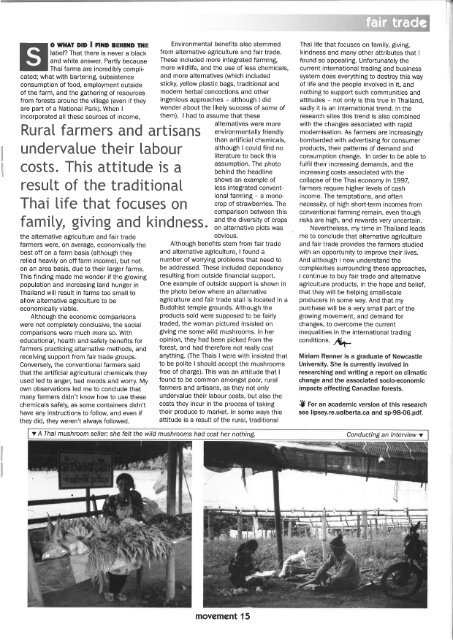Movement 102
Create successful ePaper yourself
Turn your PDF publications into a flip-book with our unique Google optimized e-Paper software.
trade<br />
Eo wHAT oro I nlo BEHtltD mE<br />
label? That there is never a black<br />
and white answer. Partly because<br />
Thai farms are incredibly complicated;<br />
what with bartering, subsistence<br />
consumption of food, employment outside<br />
of the farm, and the gathering of resources<br />
from forests around the village (even if they<br />
are part of a National Park). When I<br />
incorporated all these sources of income,<br />
Rural farmers and artisans<br />
undervatue their labour<br />
costs. This attitude is a<br />
resutt of the traditional<br />
Thai tife that focuses on<br />
famity, giving and kindness.<br />
the alternative agriculture and fair trade<br />
farmers were, on average, economically the<br />
best off on a farm basis (although they<br />
relied heavily on off-farm income), but not<br />
on an area basis, due to their larger farms.<br />
This finding made me wonder if the growing<br />
population and increasing land hunger in<br />
Thailand will result in farms too small to<br />
allow alternative agriculture to be<br />
economically viable.<br />
Although the economic comparisons<br />
were not completely conclusive, the social<br />
comparisons were much more so. With<br />
educational, health and safety benefits for<br />
farmers practicing alternative methods, and<br />
receiving support from fair trade groups.<br />
Conversely, the conventional farmers said<br />
that the artificial agricultural chemicals they<br />
used led to anger, bad moods and worry. My<br />
own observations led me to conclude that<br />
many farmers didn't know how to use these<br />
chemicals safely, as some containers didn't<br />
have any instructions to folloq and even if<br />
they did, they weren't always followed.<br />
Environmental benef its also stemmed<br />
from alternative agriculture and fair trade.<br />
These included more integrated farming,<br />
more wildlife, and the use of less chemicals,<br />
and more alternatives (which included<br />
sticky, yellow plastic bags, traditional and<br />
modern herbal concoctions and other<br />
ingenious approaches - although I did<br />
wonder about the likely success of some of<br />
them). I had to assume that these<br />
alternatives were more<br />
environmentally friendly<br />
than artificial chemicals,<br />
although I could find no<br />
literature to back this<br />
assumption. The photo<br />
behind the headline<br />
shows an example of<br />
less integrated conventional<br />
farming-amonocrop<br />
of strawberries. The<br />
comparison between this<br />
and the diversity of crops<br />
on alternative plots was<br />
obvious.<br />
Although benefits stem from fair trade<br />
and alternative agriculture, I found a<br />
number of worrying problems that need to<br />
be addressed. These included dependency<br />
resulting from outside financial support.<br />
One example of outside support is shown in<br />
the photo below where an alternative<br />
agriculture and fair trade stall is located in a<br />
Buddhist temple grounds. Although the<br />
products sold were supposed to be fairly<br />
traded, the woman pictured insisted on<br />
giving me some wild mushrooms. ln her<br />
opinion, they had been picked from the<br />
forest, and had therefore not really cost<br />
anything. (The Thais I were with insisted that<br />
to be polite I should accept the mushrooms<br />
free of charge). This was an attitude that I<br />
found to be common amongst poor, rural<br />
farmers and artisans, as they not only<br />
undervalue their labour costs, but also the<br />
costs they incur in the process of taking<br />
their produce to market. ln some ways this<br />
attitude is a result of the rural, traditional<br />
v A Thai mushroom se//er she felt the wild mushrooms had cost her nothing.<br />
Thai life that focuses on family, giving,<br />
kindness and many other attributes that I<br />
found so appealing. Unfortunately the<br />
current international trading and business<br />
system does everything to destroy this way<br />
of life and the people involved in it, and<br />
nothing to support such communities and<br />
attitudes - not only is this true in Thailand,<br />
sadly it is an international trend. ln the<br />
research sites this trend is also combined<br />
with the changes associated with rapid<br />
modernisation. As farmers are increasingly<br />
bombarded with advertising for consumer<br />
products, their patterns of demand and<br />
consumption change. ln orderto be able to<br />
fulfil their increasing demands, and the<br />
increasing costs associated with the<br />
collapse of the Thai economy in 1997,<br />
farmers require higher levels of cash<br />
income. The temptations, and often<br />
necessity, of high short-term incomes from<br />
conventional farming remain, even though<br />
risks are high, and rewards very uncertain.<br />
Nevertheless, my time in Thailand leads<br />
me to conclude that alternative agriculture<br />
and fair trade provides the farmers studied<br />
with an opportunity to improve their lives.<br />
And although I now understand the<br />
complexities surroundi ng these approaches,<br />
I continue to buy fair trade and alternative<br />
agriculture products, in the hope and belief,<br />
that they will be helping small-scale<br />
producers in some way. And that my<br />
purchase will be a very small part of the<br />
growing movement, and demand for<br />
changes, to overcome the current<br />
inequalities in the international trading<br />
conditions. /k<br />
Miriam Renner is a graduate of Newcastle<br />
University. She is currently involved in<br />
researching and writing a report on climatic<br />
change and the associated socio-economic<br />
impacts affecting Canadian forests.<br />
{ For an academic version of this research<br />
see lipsey.re.ualberta.ca and sp-9&06.pdf.<br />
Conducting an interview y<br />
o* '* fb<br />
lt<br />
/.r '\<br />
? l<br />
I ,1<br />
;, t<br />
;.r'"*iFr*<br />
movement'15
















